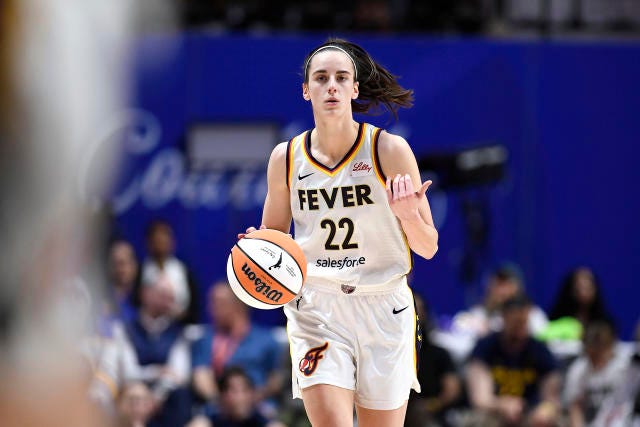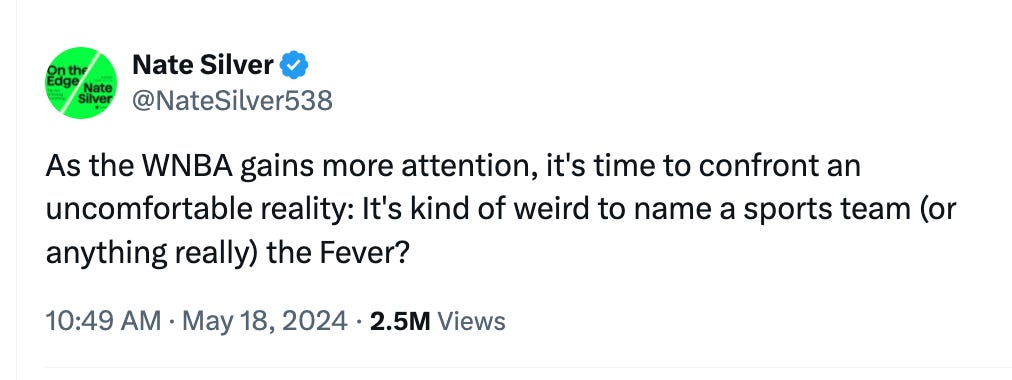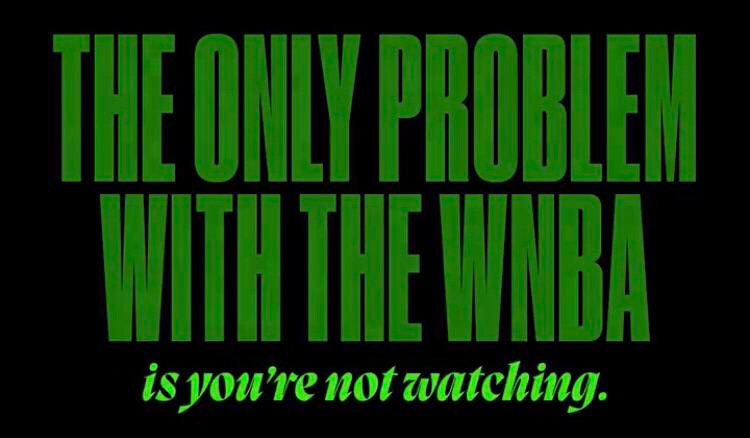Apparently You're Not Supposed to Talk About WNBA Team Names?
Beware this DANGEROUS topic
Welcome to my second post about a media firestorm following a Nate Silver tweet. He’s potent that way. In recent years Silver’s become a magnet for hysterical overreaction due to a range of reasons, mostly related to media neuroticism regarding politics. These days Nate muses on how a thing might be improved and boom! A certain type of media person goes insane because Nate didn’t “read the room” or whatever. This commentator just “knows” that Nate is “bad” now, and that it is important to snidely broadcast this to the peer group.
My truth is different. I think Nate’s great, and would say as much even if he hadn’t appeared on the pod. His work is thought provoking and often fun. The haters are missing out. I’ve no clue if the great mass of them have a cogent reason for despising one of the sharper pundits in American commentary. Perhaps they do, and perhaps they’re just copying friends who are copying friends who are copying friends.
By merely existing, out loud, on X, Nate reminds of how insanely low the bar is for becoming an Internet Main Character in sports media. For all the decrying of “hot takes,” the world of professional sports media is actually overly mannered, operating under more hidden taboos than the Victorian aristocracy. Back in the day, to be controversial, I felt like I had to really earn infamy. Even in the especially hysterical 2020 days, there was this sense that, yes, you could get fired over nothing, but at least that nothing would be related to something serious, like America’s race relations.
Now? It seems like you could piss off a critical mass of former colleagues over anything with the vague patina of cultural violation and they don’t even bother to justify their anger as being all that meaningful. Here we have this apparently aggregation worthy reaction to the following Nate Silver tweet from Saturday. Why is this a big deal?
In this instance, Silver’s controversy follows my own. Apparently I was written up in Awful Announcing and Fox News for violating the same exact sacred taboo of insufficient reverence for WNBA team names. My only defense is that..wait, what are these people even mad at?
I’d known that I’d pissed some people off by suggesting the NBA should share team names with the WNBA, but closed myself off to news of this Important Development after Friend of Pod Spike Eskin righteously defended me. Thanks Spike, hopefully I’ll survive this.
The main point is that you must stay away from any WNBA team name topic. It’s dangerous. Maybe you think the Valkyries would resonate more in the Bay Area if they had a different moniker. Keep it to yourself. Don’t be like me, a guy who mused that perhaps the WNBA should adopt a team name model that’s worked at the college level and in European soccer. That was against the rules and now we realize this.
And while we’re here, and I’m now learning from this rule-enforcement aggregation, let’s pause on this Awful Announcing paragraph from Ben Axelrod:
Furthermore — and this may speak to Strauss’ lack of knowledge regarding the league — not every team in the WNBA shares a city or ownership group with an NBA team. So even if we concede there would be benefits to the the Lynx becoming the “W-Timberwolves,” what would that mean for the teams located in Las Vegas, Seattle and Connecticut? If anything, it would just cause further confusion.
Ah yes, this reasonable low stakes opinion might just result from “lack of knowledge” (of something literally everyone working in the NBA knows about). I’m not sure why this paragraph has the patronizing tone of your least favorite corporate culture officer’s seminar. It’s like hearing Bill Lumbergh wonder whether you simply didn’t know about the TPS reports, only he’s inquiring about whether you missed the memo on women’s basketball in Las Vegas.
But wait. Ben thinks fans would be confused by some teams having NBA names but not others? I thought the whole scoldy point is that branding isn’t even an issue to discuss because it’s so easy to remember a team’s name. Now we’re coming up with scenarios where the existence of the W Warriors impedes one’s ability to comprehend the Las Vegas Aces? What?
Whatever the WNBA has done with branding hasn’t appeared to work on guys like Axelrod, who effectively never tweets about the league unless it’s to hop on this particular sanctimony bandwagon. He doesn’t really watch the WNBA, by his own admission, but that’s okay. Literally, it is okay. Unlike some political leaders, I don’t insist that there’s a moral obligation to watch certain leagues.
This is the cultural space the WNBA operates within in sports media though, above reproach but beneath judgment. With the NBA, I can comfortably tell you that “Wizards” was a terrible team name choice. I could tweet it today with minimal pushback. The Heat? The Thunder? Those “hard to make plural” names were also suboptimal selections. Nobody cares if I think this, even if these franchises are now much loved brands within their respective regions. But if I dare agree with Nate Silver that Caitlin Clark’s new team has a less than catchy name…that’s apparently wrong. The team names are fine, find a new slant!
The backdrop to this sensitivity is that Caitlin Clark is on the scene, representing the potential for renewed interest in the league. This seems great, but prior to this moment, the overarching message about the league is that you’re the problem for not watching. Seriously. This was the literal Nike ad campaign about the WNBA.
More than any other league, the WNBA brand is infused with this sense that you’ve a moral obligation to support it. The current U.S. president even made that theme specific when celebrating the reigning WNBA champion Aces, saying:
We need to support women’s sports by showing — (applause) — by showing up in person, watching on TV with more sponsorships and programming, and helping grow the business of women’s sports and keep — that keep inspiring — you keep inspiring the entire nation.
He also tweeted:
As a nation, we need to support women’s sports by showing up in person and watching on TV – with more sponsorships and programming.
Personally, I just watch sports to be entertained. It’s not a hobby infused with this intense sense of social responsibility. But apparently, with this sport, others see it differently. This is why the operating consensus in sports media is that this league cannot fail, but only be failed. It’s incumbent on society to watch this form of basketball as a cause, rather than as an activity.
Downstream of the cause is the impulse by adherents to attack anyone seen as undermining it. Have a mild critique of the WNBA? Shut up! Obviously you’re the problem, not the league. The league is perfect, don’t you get it?!
It’s all pretty silly. Ultimately, the WNBA’s fortunes likely won’t rise or fall on the basis of team names (Nate and I were just riffing, dude). Its future also won’t hinge on whether enough Substackers pledge fealty. I’m curious about the league’s trajectory, but, as a topic, I see the WNBA as similar to Nate Silver himself: It’s a mirror for a media mentality in which the subject of commentary isn’t quite the subject. The subject isn’t the writer, or the sports league, but instead one’s defense of an ideological cause.
So what’s in a name? Not much, but you’re better off avoiding even low stakes commentary about it. A league is something you can critique. A cause is something you can only be seen as attacking when you critique it.






If Silver would've continued with "The name 'Fever' is insensitive to Covid victims, who were disproportionally people of marginalized communities" he would've been applauded.
Someone should put Bill Burr's routine about the WNBA on a loop for everyone